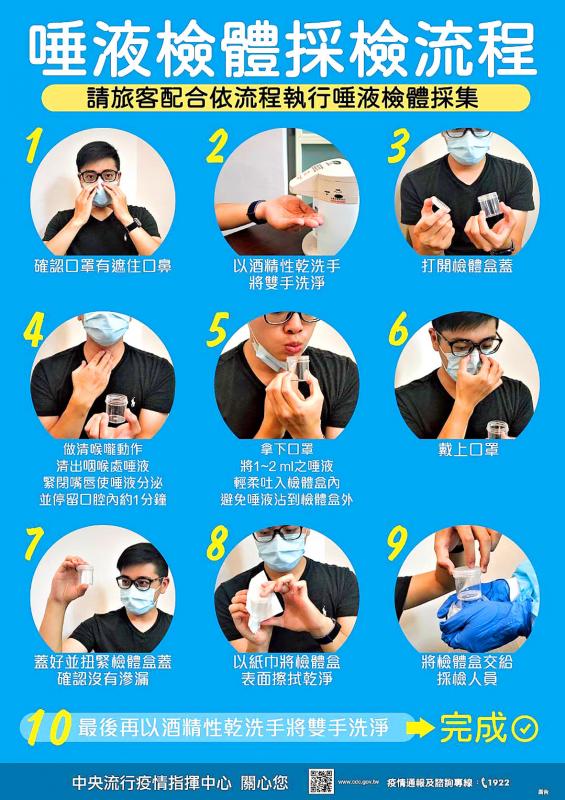The Central Epidemic Command Center (CECC) has decided to change the kind of polymerase chain reaction (PCR) diagnostic tests for SARS-CoV-2 required from international travelers arriving at airports, as of tomorrow.
Health authorities would take deep throat saliva (DTS) specimens instead of throat swabs, the center said yesterday.
The CECC evaluated the efficacy of DTS tests between July 2 and Monday last week, with DTS and throat swabs collected from 1,226 travelers who were required to take a COVID-19 test upon arrival at an airport, said Centers for Disease Control (CDC) Deputy Director-General Chuang Jen-hsiang (莊人祥), the CECC spokesman

Photo courtesy of the Central Epidemic Command Center
“Among the travelers who were tested, 24 people were confirmed to have COVID-19,” Chuang said.
The test results from DTS and throat swab samples were positive for 12 people, while eight more tested positive with DTS, but negative from the throat swabs, and four people were negative from DTS, but positive from throat swabs, he said.
Given that the performance of the DTS tests was not inferior to throat swab specimens, airport testing would be changed to collecting DTS specimens, he said.
The DTS specimens would be collected by travelers themselves, and would only need specialists to oversee the process, which would also decrease staffing requirements, as a physician and a nurse are currently required to perform a throat swab, Chuang said.
International arrivals who tested negative in DTS testing would still be reported for more testing if they develop COVID-19 symptoms during the mandatory 14-day quarantine, so the change would not affect the nation’s disease prevention, he added.
Separately yesterday, the CECC contacted Chinese authorities after learning that a Taiwanese had tested positive for COVID-19 in Shanghai, and received a reply at noon, Chuang said.
The person is in their 20s and lives in the US.
They had left Taiwan on July 13, 2006, and did not return until Aug. 4, he said.
The person was quarantined for 14 days after arrival, with an additional seven days of self-health management, which they completed on Tuesday last week, and two days later they left for Shanghai with family members.
The person said they had not developed COVID-19 symptoms in Taiwan or after they arrived in Shanghai, but they were asked to take a COVID-19 test due to a slightly high temperature of 37.8°C, Chuang said.
The test result came back positive on Saturday, he said.
“The cycle threshold value from the real-time PCR test on the case was above 35, and the COVID-19 antibody testing showed positive with IgG and IgM antibodies,” Chuang said.
“We suspect that the individual contracted the disease in the US,” he added.
The person claimed to have no COVID-19 symptoms and did not seek medical attention in the US, so it is likely that they were not contagious during the time they were in Taiwan, therefore the public should not worry, he said.
However, the CECC would check the person’s family members to see if they have developed any symptoms, Chuang said.

Right-wing political scientist Laura Fernandez on Sunday won Costa Rica’s presidential election by a landslide, after promising to crack down on rising violence linked to the cocaine trade. Fernandez’s nearest rival, economist Alvaro Ramos, conceded defeat as results showed the ruling party far exceeding the threshold of 40 percent needed to avoid a runoff. With 94 percent of polling stations counted, the political heir of outgoing Costa Rican President Rodrigo Chaves had captured 48.3 percent of the vote compared with Ramos’ 33.4 percent, the Supreme Electoral Tribunal said. As soon as the first results were announced, members of Fernandez’s Sovereign People’s Party

MORE RESPONSIBILITY: Draftees would be expected to fight alongside professional soldiers, likely requiring the transformation of some training brigades into combat units The armed forces are to start incorporating new conscripts into combined arms brigades this year to enhance combat readiness, the Executive Yuan’s latest policy report said. The new policy would affect Taiwanese men entering the military for their compulsory service, which was extended to one year under reforms by then-president Tsai Ing-wen (蔡英文) in 2022. The conscripts would be trained to operate machine guns, uncrewed aerial vehicles, anti-tank guided missile launchers and Stinger air defense systems, the report said, adding that the basic training would be lengthened to eight weeks. After basic training, conscripts would be sorted into infantry battalions that would take

EMERGING FIELDS: The Chinese president said that the two countries would explore cooperation in green technology, the digital economy and artificial intelligence Chinese President Xi Jinping (習近平) yesterday called for an “equal and orderly multipolar world” in the face of “unilateral bullying,” in an apparent jab at the US. Xi was speaking during talks in Beijing with Uruguayan President Yamandu Orsi, the first South American leader to visit China since US special forces captured then-Venezuelan president Nicolas Maduro last month — an operation that Beijing condemned as a violation of sovereignty. Orsi follows a slew of leaders to have visited China seeking to boost ties with the world’s second-largest economy to hedge against US President Donald Trump’s increasingly unpredictable administration. “The international situation is fraught

GROWING AMBITIONS: The scale and tempo of the operations show that the Strait has become the core theater for China to expand its security interests, the report said Chinese military aircraft incursions around Taiwan have surged nearly 15-fold over the past five years, according to a report released yesterday by the Democratic Progressive Party’s (DPP) Department of China Affairs. Sorties in the Taiwan Strait were previously irregular, totaling 380 in 2020, but have since evolved into routine operations, the report showed. “This demonstrates that the Taiwan Strait has become both the starting point and testing ground for Beijing’s expansionist ambitions,” it said. Driven by military expansionism, China is systematically pursuing actions aimed at altering the regional “status quo,” the department said, adding that Taiwan represents the most critical link in China’s